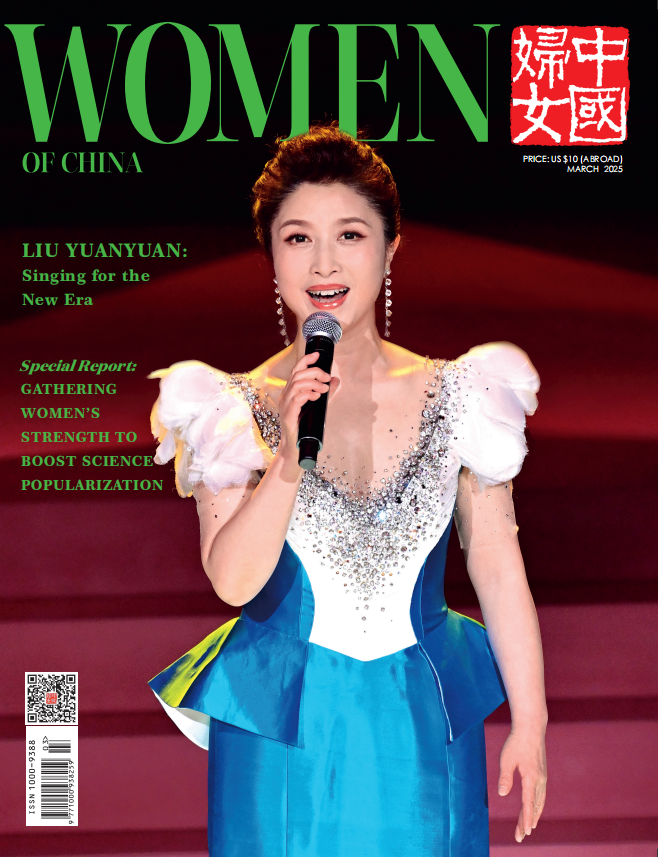Beautiful New Farmers | Woman Devoted to Black Soil

Lishu County, in Siping, a city in northeast China's Jilin Province, is a national grain-producing county. The county is located in the heart of Songliao Plain's golden corn belt. Han Fengxiang is director of a rural cooperative in the county. She has led locals in improving their farming efficiency, promoted conservation-tillage techniques, and extended the rural industrial chain. Han was named a National March 8th Red-Banner Holder in 2023.
Founding the Cooperative
Han, born in 1982, is from a family of farmers in Lishu. She has a deep attachment to the region's fertile black soil. After she graduated from college, in 2008, she found a job in the city. That year, during a visit to her hometown, Qingduizi, a village in Guojiadian, a town in Lishu, Han noticed the farming was being performed mainly by the women and elderly residents. She also noticed large-scale mechanization and advanced agricultural techniques were not being applied. Determined to change this, Han quit her job and moved back home. She decided to introduce intensive-production models to improve farming efficiency, and to boost villagers' incomes.
In March 2010, Han used her family's savings and secured around one million yuan (US $140,845) in loans to purchase more than 30 large and medium-sized agricultural machines. She also established Fenghuangshan Agricultural Machinery and Farmers' Cooperative, in Lishu. At first, only five other villagers joined the cooperative. Han didn't lose heart; instead, she went door-to-door to explain her plan for the cooperative, that the villagers' land would be operated by the cooperative, and how the cooperative would ensure the grain yields would not be lower than and input costs not higher than neighboring areas. Gradually, more villagers joined, and the cooperative began to thrive.

Leading Villagers to Prosperity
For years, the villagers relied on "farming by the weather;" as such, they lacked soil-conservation knowledge. This led to degraded black soil areas, which turned thin and sandy. Low crop yields and high agricultural equipment depreciation became common. To restore the soil, Han learned about "straw mulching," a conservation-tillage technique, from agricultural experts. Initially, villagers argued leaving post-harvest corn stalks in the fields was being "lazy." Han patiently explained the straw acted like a "blanket," retaining moisture and preventing soil erosion. To prove her point, she turned her own land into an experimental plot.
By spring, Han's trial field had sprouted, and was robust with lodging-resistant corn seedlings. The following autumn, her yield was 30 percent higher than it would have been using a more traditional method. The technique soon gained support. In the coming years, the soil was visibly darkened, and harvests grew steadily.
Today, the cooperative spans nine villages, across two townships, and operates 73 large agricultural machines, with 158 members managing nearly 1,000 hectares of land. The cooperative has created jobs, and it has helped farmers increase their incomes. It employs 72, and it has trained 25 agricultural technicians. Han also leads public-welfare efforts, assisting a dozen elderly and disabled families with free harvesting every year. Han also often makes donations to in-need households and nursing homes.

Developing Smart Agriculture
Han continuously upgrades her skills, so she can better run the cooperative. Since 2015, she has attended provincial training programs, and she has enrolled in correspondence courses offered by Northeast Agricultural University, in northeast China's Heilongjiang Province. Her expertise has earned her the title of senior agricultural technician, recognized by Jilin Province's human resources department.
In 2023, the cooperative joined a national digital-farming project. Thus, Han began embracing smart agriculture. The cooperative uses intelligent devices to monitor the weather and the land, and it purchases high-end agricultural machines, to ensure the transformation from "traditional" to "intelligent" farming.
Beyond its scaling of grain production, the cooperative has extended its rural industrial chain by introducing new crop varieties, corn-soybean intercropping, and by developing specialty crops. The cooperative was named a national women's modern agricultural sci-tech demonstration base in 2022.
Han in 2023 was elected a deputy to the National People's Congress (NPC), China's top legislature. Since then, Han has conducted extensive research, and she has visited cooperatives, across Lishu, to learn from their experiences. Han has made several suggestions during NPC sessions, including calling for an increase in rural infrastructure investment, urging greater subsidies on agricultural machines, and seeking more technical training for farmers.
In May 2024, Han participated in an NPC youth delegation tour to Russia. She shared Jilin's agricultural achievements and her entrepreneurial journey with her hosts, and she said she hoped to promote her hometown's agricultural products in global markets.
What is in her future? Han plans to integrate online and offline sales channels, and also to launch live-streaming sales initiatives, to help the villagers promote their local produce. Inspired by Han's example, more young people are returning home, and they are contributing their wisdom and strength to the promotion of rural development and revitalization.
Photos from Interviewee
(Women of China English Monthly April 2025)
Editor: Wang Shasha
Please understand that womenofchina.cn,a non-profit, information-communication website, cannot reach every writer before using articles and images. For copyright issues, please contact us by emailing: website@womenofchina.cn. The articles published and opinions expressed on this website represent the opinions of writers and are not necessarily shared by womenofchina.cn.







.jpg)

 WeChat
WeChat Weibo
Weibo 京公网安备 11010102004314号
京公网安备 11010102004314号